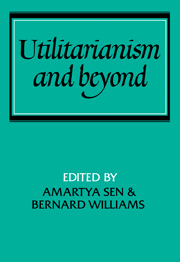Book contents
- Frontmatter
- Contents
- Preface
- Introduction: Utilitarianism and beyond
- 1 Ethical theory and utilitarianism
- 2 Morality and the theory of rational behaviour
- 3 The economic uses of utilitarianism
- 4 Utilitarianism, uncertainty and information
- 5 Contractualism and utilitarianism
- 6 The diversity of goods
- 7 Morality and convention
- 8 Social unity and primary goods
- 9 On some difficulties of the utilitarian economist
- 10 Utilitarianism, information and rights
- 11 Sour grapes – utilitarianism and the genesis of wants
- 12 Liberty and welfare
- 13 Under which descriptions?
- 14 What's the use of going to school?
- Bibliography
3 - The economic uses of utilitarianism
Published online by Cambridge University Press: 30 January 2010
- Frontmatter
- Contents
- Preface
- Introduction: Utilitarianism and beyond
- 1 Ethical theory and utilitarianism
- 2 Morality and the theory of rational behaviour
- 3 The economic uses of utilitarianism
- 4 Utilitarianism, uncertainty and information
- 5 Contractualism and utilitarianism
- 6 The diversity of goods
- 7 Morality and convention
- 8 Social unity and primary goods
- 9 On some difficulties of the utilitarian economist
- 10 Utilitarianism, information and rights
- 11 Sour grapes – utilitarianism and the genesis of wants
- 12 Liberty and welfare
- 13 Under which descriptions?
- 14 What's the use of going to school?
- Bibliography
Summary
Some economists, when evaluating alternative economic policies, are utilitarians. At any rate they look at something they call the total utility of the outcome. This paper is intended to argue in favour of this procedure. It may be as well first to exemplify it.
An interesting question is how much income ought to be redistributed from those with high wages and salaries to those with low wages. To answer it, one can set up a model in which each individual's utility is a numerical function of his net income, after taxes and subsidies, and of the quantity of labour he supplies. Each individual, supposedly knowing how his income depends on the labour he supplies, decides how much to supply by computing what will maximise his utility. All these labour supply decisions taken together determine the output of the economy. A redistributive system, consisting of taxes and subsidies, is feasible provided that the output of the economy is sufficient to provide for public and private expenditures, private expenditures being determined by private net incomes. The object of the exercise is to find which feasible redistributive system yields the greatest total utility.
This is not the place to defend the simplifications of such an economic analysis, far less to discuss how it might be improved. Even within the model outlined, assumptions as to the kinds of taxes and subsidies that are possible have a substantial effect on the results. I shall want to return to this aspect later, by way of illustration. The first issue is whether it is possible to specify numerical utility functions, in order to carry out such an analysis of redistributive policies.
- Type
- Chapter
- Information
- Utilitarianism and Beyond , pp. 63 - 84Publisher: Cambridge University PressPrint publication year: 1982
- 45
- Cited by



